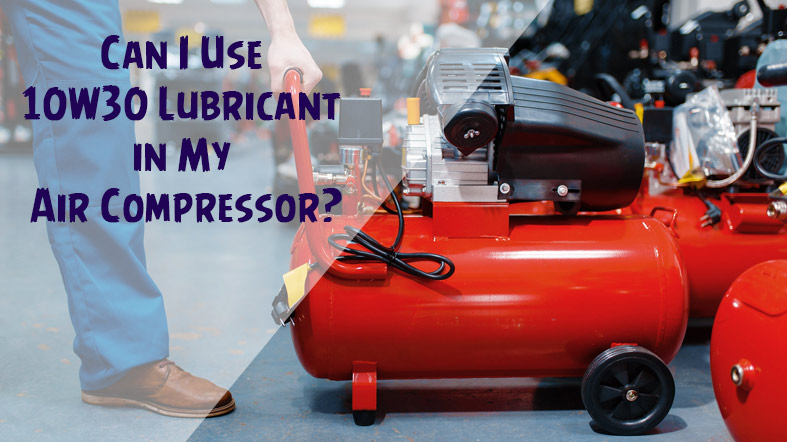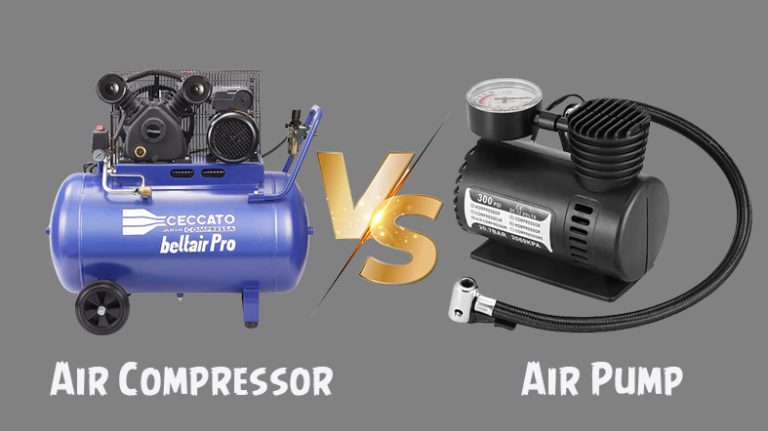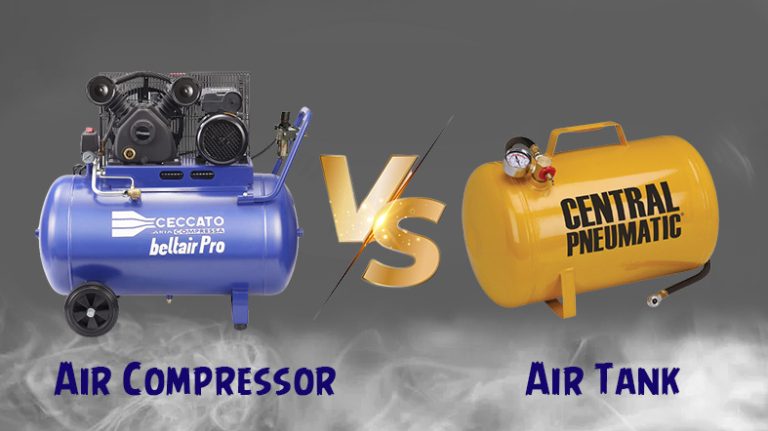Can I Use 10W30 Lubricant in My Air Compressor?
Yes, you can use 10w30 in your air compressor The 10w30 oil is suitable for various types of machinery and can provide the necessary lubrication for your air compressor.
This oil grade offers good viscosity in both cold and hot weather conditions, ensuring the smooth operation of your machine. So, feel free to use 10w30 oil in your air compressor for optimal performance and lubrication.

Importance of Using The Right Lubricant
Using the right lubricant for your air compressor is crucial to ensure proper functioning and extend its lifespan. Differentiating between lubricants and understanding their applications is essential in making the right choice. Additionally, using the wrong lubricant can lead to potential risks and consequences that can harm your air compressor.
Differentiating Between Lubricants and Their Applications
Lubricants come in various types, each designed for specific applications. Understanding the differences will help you choose the right lubricant for your air compressor. Consider the following:
- Mineral-based lubricants: These lubricants are derived from crude oil and provide excellent lubrication at high temperatures. They are suitable for general-purpose applications and are cost-effective.
- Synthetic lubricants: Manufactured from chemically engineered compounds, synthetic lubricants offer superior performance and are ideal for extreme operating conditions. They provide better lubrication, heat dissipation, and resistance to oxidation.
- Semi-synthetic lubricants: A blend of mineral-based and synthetic lubricants, semi-synthetics offer advantages from both types. They provide improved lubrication and thermal stability while being more cost-effective than fully synthetic oils.
- Food-grade lubricants: These specialized lubricants are designed specifically for applications in food processing industries. They are non-toxic, tasteless, and odorless, ensuring the safety of food products.
Potential Risks and Consequences of Using The Wrong Lubricant
Using the wrong lubricant in your air compressor can have detrimental effects, leading to various risks and consequences, such as.
- Reduced efficiency: Using an incompatible lubricant may result in reduced efficiency, causing the air compressor to consume more energy. This can lead to higher operating costs and decreased overall performance.
- Component wear and damage: Lubricants are not one-size-fits-all. Using the wrong lubricant can cause increased wear and damage to crucial components, such as cylinders, valves, and pistons. This can result in costly repairs and decreased lifespan of the air compressor.
- Increased heat and friction: Inadequate lubrication due to using the wrong lubricant can lead to increased heat and friction within the air compressor. This can cause overheating, premature part failure, and potentially dangerous situations.
- Inefficient moisture removal: Some air compressor lubricants have properties that help in moisture removal from the compressed air system. Using the wrong lubricant can hinder this process, leading to increased moisture content and potential corrosion within the system.
- Safety hazards: Using an incorrect lubricant can pose safety risks, such as the lubricant igniting under high temperatures or reacting with compressed air or other substances. This can lead to explosions, fires, or other hazardous situations.
Analyzing The Compatibility of 10W30 Oil with Air Compressors
When it comes to choosing the right oil for your air compressor, it’s important to consider the compatibility of different types of oils. One commonly asked question is whether 10w30 oil can be used in air compressors. In this section, we will examine the characteristics of 10w30 oil and its suitability for air compressors, compare the advantages and disadvantages of using 10w30 oil, and consider the potential impact on compressor performance and longevity.
Examining The Characteristics of 10W30 Oil And Its Suitability for Air Compressors
- 10w30 oil is a multi-viscosity oil commonly used in automotive engines.
- It has a viscosity grade of 10 for cold temperatures and 30 for normal operating temperatures.
- The viscosity of 10w30 oil provides adequate lubrication for many mechanical systems, including air compressors.
- However, air compressors operate under different conditions and may have specific oil requirements.
Comparing The Advantages and Disadvantages of Using 10W30 Oil In Air Compressors
Advantages:
- Availability: 10w30 oil is widely available and can be found easily at automotive and hardware stores.
- Cost: Compared to specialized compressor oils, 10w30 oil may be more affordable.
- Versatility: If you already have 10w30 oil on hand for other equipment, you may be able to use it in your air compressor as well.
Disadvantages:
- Viscosity: The viscosity of 10w30 oil may not be ideal for certain air compressors, especially those operating in extreme temperatures or high-pressure environments.
- Oxidation: Air compressors generate heat, which can cause 10w30 oil to oxidize and degrade more quickly over time.
- Warranty concerns: Some air compressor manufacturers specify using specific oils to maintain warranty coverage. Using 10w30 oil may void the warranty in some cases.
Considering The Potential Impact of 10W30 Oil on Compressor Performance and Longevity
- Inadequate lubrication: The viscosity of 10w30 oil may not provide sufficient lubrication for certain air compressors, leading to increased wear and potential damage.
- Reduced efficiency: Using oil with the wrong viscosity can result in reduced compressor efficiency, leading to increased energy consumption and higher operating costs.
- Decreased lifespan: If the oil does not meet the compressor’s lubrication requirements, it can contribute to premature wear and ultimately shorten the compressor’s lifespan.
Factors to Consider Before Using 10W30 in Your Air Compressor
If you’re wondering whether it’s safe to use 10w30 in your air compressor, there are several factors you should take into consideration. While 10w30 is a commonly used motor oil, determining whether it’s suitable for your air compressor requires careful evaluation of various aspects. Let’s delve into the key considerations before making a decision.
Evaluating The Environmental Conditions and Operating Temperatures
The environmental conditions in which your air compressor operates play a significant role in oil selection. Various factors, including ambient temperature and humidity, can impact oil performance. Consider the following:
- Evaluate the operating temperature range specified by the manufacturer. If your air compressor operates in extreme temperatures, you may need an oil with a different viscosity grade to ensure proper lubrication.
- In cold environments, 10w30 oil tends to provide better flow and lubrication at startup compared to heavier oils.
- In hot climates or high ambient temperatures, a heavier oil may be necessary to provide adequate lubrication and prevent breakdown under thermal stress.
Assessing The Oil Consumption Rate and Maintenance Requirements
Understanding the oil consumption rate of your air compressor and the associated maintenance requirements is crucial for making an informed decision. Here are a few points to keep in mind.
- Evaluate the oil consumption rate of your air compressor. Heavier oils like 10w30 generally have higher viscosity and may result in increased oil consumption.
- Consider the frequency of oil changes required for different viscosity grades. Lighter oils may offer longer service intervals, reducing maintenance requirements.
- Take into account any special additives or requirements specified by the manufacturer for optimal compressor performance and longevity.
Frequently Asked Questions and Answers
Can I Use 10W30 Oil In My Air Compressor?
Using 10w30 oil in your air compressor is not recommended. Air compressors require specific lubricants with high resistance to heat and pressure. Using the wrong oil can result in poor performance, increased wear and tear, and potentially expensive repairs. It’s important to use the oil recommended by the manufacturer for optimal performance and longevity of your air compressor.
What Happens If I Use The Wrong Oil In My Air Compressor?
Using the wrong oil in your air compressor can lead to several issues. The wrong oil may not provide sufficient lubrication, leading to increased friction and wear on the compressor’s internal components. It can also cause overheating, reduced efficiency, and even damage to the compressor.
To avoid these problems, always use the recommended oil specified by the manufacturer.
What Type Of Oil Should I Use In My Air Compressor?
The type of oil you should use in your air compressor depends on the compressor’s specifications and usage. Most compressors require oils with high viscosity to withstand the heat and pressure generated during operation. Look for compressor oils labeled as iso 100 or higher, or oils specifically designed for air compressors. Always consult your compressor’s manual or manufacturer for the recommended oil.
How Often Should I Change The Oil In My Air Compressor?
The frequency of oil changes in your air compressor depends on various factors, including usage, operating conditions, and compressor type. As a general guideline, it’s recommended to change the oil every 500 to 1,000 hours of operation, or according to the manufacturer’s instructions. Regular oil changes help maintain optimal lubrication and extend the lifespan of your air compressor.
What Are The Consequences Of Not Changing The Oil In My Air Compressor?
Not changing the oil in your air compressor can lead to a range of problems. Over time, the oil becomes contaminated with dirt, debris, and moisture, which can impair lubrication and increase wear on the compressor’s internal parts. Insufficient lubrication can cause overheating, decreased performance, and even compressor failure. Regular oil changes are essential to keep your air compressor running smoothly and efficiently.
Conclusion
It is important to use the recommended oil for your air compressor to ensure optimal performance and longevity. While it may be tempting to use 10w30 oil due to its availability and affordability, it is not suitable for all air compressors.
The viscosity and composition of the oil play a crucial role in lubricating and protecting the internal components of the compressor. Using the wrong type of oil, such as 10w30, can lead to increased wear and tear, inefficient operation, and potential damage to the compressor.
To ensure the proper functioning of your air compressor, always refer to the manufacturer’s recommendations and specifications regarding the type and viscosity of oil to be used. It is better to invest in the right oil for your compressor rather than risk costly repairs or premature replacement.
Take care of your air compressor, and it will continue to serve you well for years to come.





![Where is the Reset Button on Kobalt Air Compressor [Explained]](https://airanswer.com/wp-content/uploads/2023/07/where-is-the-reset-button-on-kobalt-air-compressor-768x432.jpg)